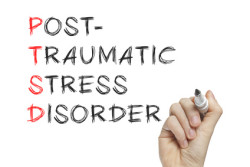PTSD
Post Traumatic Stress Disorder Rehab & Treatment
Post-Traumatic Stress Disorder, also known as PTSD, is a severe anxiety disorder and emotional illness that can develop  after an individual has been exposed to a terrifying event in which the person was threatened with, or received severe physical harm.
after an individual has been exposed to a terrifying event in which the person was threatened with, or received severe physical harm.
While most people associate PTSD with soldiers as a byproduct of combat, PTSD can actually affect anyone who suffers, or witnesses, a catastrophic or life-threatening event.
This can include such events as witnessing or experiencing a severe accident resulting in personal injury, being the victim of crime or torture, rape, sudden death of a loved one, getting into a bad car accident, being in a natural disaster or terrorist attack, enduring some form of abuse, just to name a few.
It is important to remember that Post Traumatic Stress Disorder is a serious mental health condition and can have far reaching consequences if left untreated. Not only can it severely undermine a person’s emotional well-being and mental health, but it can negatively affect a person’s work, relationships, motivation, and can cause severe depression, even suicidal thoughts.
Unfortunately, an overwhelming number of military suicides are caused by the severe depression and anxiety these soldiers had to suffer with because of their untreated PTSD symptoms.
Treating PTSD

PTSD symptoms often go hand in hand with substance abuse, Inspire Malibu can treat both symptoms simultaneously. We use a variety of cutting edge methods to help patients suffering from PTSD face their trauma and pain in a safe and nurturing environment, while using a combination of proven therapies and treatment.
To ensure successful treatment, our staff incorporates the following forms of therapy. All are proven therapies for PTSD and addiction treatment.
- Stages of Change
- Cognitive-Behavioral Therapy
- Motivational Enhancement Therapy
- Dialectical Behavioral Therapy
- One on One Therapy
- Medication
Whether you are a military veteran, or someone who experienced significant trauma in a catastrophic event, there is a lot of great treatment options available for individuals suffering from PTSD. PTSD treatment includes counseling, one-on-one and group therapy, pharmacotherapy, anger management, and learning how to heal emotionally and deal with your anxiety in everyday life.
Symptoms of PTSD
While PTSD symptoms generally start within three months after a traumatic event, these symptoms can emerge years after a catastrophic event has occurred. Generally, PTSD symptoms are grouped into four different categories: intrusive memories, avoidance, negative changes in mental health and mood, and physical and emotional health reactions.
Intrusive Memories
• Severe emotional reactions to something that reminds you of a traumatic event that happened in your life
• Reliving the traumatic event as if it were happening to you right now, also known as “flashbacks”
• Uncontrollable, recurring thoughts about the traumatic event no matter how hard you try to forget it
• Being constantly alert or on guard
Avoidance
• Avoiding, sometimes at great length, any possible reminders of the trauma
• Trying to avoid thinking or talking about the traumatic event
• Avoiding people, places, or activities that might remind the person of the traumatic event
Negative Changes in Mental Health and Mood
• Severe depression
• Inability to experience happiness, joy, or positive emotions
• Feeling emotionally numb
• Lack of interests in school, work, relationships
• Isolation
• A feeling of hopelessness
• Memory problems
• Negative feelings about yourself and others
• Suicidal thoughts
Physical and Emotional Health Reactions
• Panic attacks
• Chronic Pain
• Headaches
• Tightness or burning in the chest
• Substance Abuse
• Problems with relationships
• Having problems functioning in normal daily living activities
The Difference between a Normal Response to Trauma and PTSD
While it is true that following a traumatic event almost everyone experiences at least some symptoms of PTSD, however, for the majority of individuals, these symptoms are only short-lived. PTSD becomes a disorder when the symptoms do not alleviate for months after the incident.
The general rule of thumb is, that if these post-traumatic stress symptoms have not alleviated, or have only gotten worse three months after the traumatic event, it may be time to talk to your doctor about the symptoms that you’re having.
However, post-traumatic stress symptoms may not appear for months, even years after the traumatic event has taken place, so it is important to keep a close eye on any abrupt changes in emotional or mental health, even a few years after a traumatic incident.
Read More About PTSD